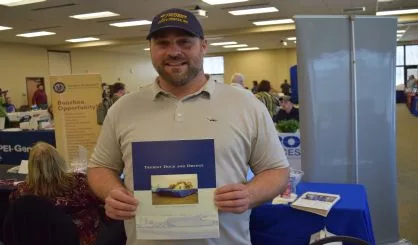Southwestern Michigan College welcomed more than 50 employers, as well as students, to its Career Fair this week. SMC Tells us more:
In addition to chatting with 56 employers offering a multitude of job opportunities, Southwestern Michigan College students attending March 16’s Career Fair in Mathews Conference Center heard from mother-daughter entrepreneurs and Watervliet’s Trident Dock and Dredge.
Tracy Saylor and daughter Robin Bowman started their inspirational sign business in their garage in 2013, built it by progressing to craft shows and Etsy, the online platform for handmade items and, since 2018, renovating Division Tire, 313 E. Division St., Dowagiac, into Salted Words, a workshop and classes space. Its name comes from Colossians 4:6, “Let your speech be always with grace, seasoned with salt, that ye may know how ye ought to answer every man.”
“Our wooden signs lift people up,” Tracy said. “Words on your walls lift up people in the home. We work with 4×8-foot sheets of plywood we cut and paint. Our garage is so small it was hard to turn around.”
“Owning a small business, it’s imperative to keep an attitude of gratefulness because you never know what to expect. Consistency and perseverance have brought us this far. We could sell 20 signs in a day or zero,” Tracy said. “Social media is a very important aspect of our business as our marketing platform.”
“Home décor is very competitive,” Robin said. “We currently sell online only. Social media is all about your presence and the frequency with which you use it. Instagram is our favorite. We find influencers and ask them if they’d like to collaborate with our business by sharing our products on their platforms to get our brand out there. I never want to go back to a conventional job.”
“Improving our building beautifies our city and is a huge benefit,” Tracy said. “Maybe somebody will see it and consider buying a junk building to bring back to life. A rising tide lifts all boats. If you do something great for yourself, your family and your city, it benefits me. If I do something great for myself, my family and my city, it benefits you. We all rise by working together.”
Trident Dock and Dredge specializes in inland-lake marine construction.
Trident was represented by Mark Schmitt, vice president of operations, and a former Montana Grizzlies college football player.
“We build permanent piers, boat hoists, steel seawalls and rip rap and bioengineered shorelines,” Schmitt said. “This is different than a seasonal boat lift a person takes in and out of the water every year. These are permanent. We’re pile drivers, able to penetrate 15 feet into the ground. We’re doing one in the St. Joseph River this spring for a 38-foot Pursuit.”
After Lake Michigan hit record high water levels for eight months in 2020, shrinking shorelines, “Rip rap is getting really popular as an alternative to vertical seawalls,” Schmitt said. “Natural stone is readily available to break wave energy. We did a smaller job on Paw Paw Lake, with 26 miles of shoreline, and planted a weeping willow tree where they put in kayaks and canoes. Rip rap is extremely resistant to wave energy — especially when you think of the force of Lake Michigan. Rocks absorb that energy. People put in seawalls to gain land when lake levels went down, but we lost habitat for turtles, frogs and snakes as banks we fished on became seawalls. Things are more regulated now.
“Around 2007-08 we did a lot of investigative work with Michigan State University, EGLE (Michigan Department of Environment, Great Lakes and Energy) and other contractors to come up with bioengineered solutions, like an encapsulated soil lift on Gull Lake.
“These are biodegradable coconut erosion blankets,” he explained. “Inside these we’re revegetating native Michigan plants back into the shorelines to take root and hold soil. When a wave hits a vertical seawall, it’s the ‘bathtub effect.’ It hits the wall and deflects, it’s choppy. The lake never calms down. Pretty soon, the state won’t allow any more seawalls.”
“There’s not a lot of people who do this,” Schmitt acknowledged, “so we train young people to make it a career path. We need mechanics, people to work on barges, equipment operators, carpenters, welders. If you’re interested in a summer job, I can give you a lot of hours.”






